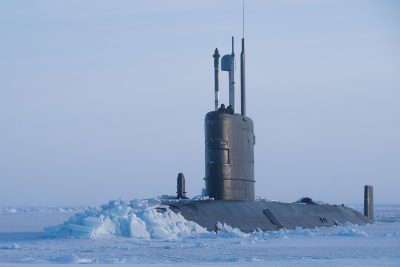Arctic Tensions Rise as Britain Leads Show of Force Against Russia in the Barents Sea

In the first such operation of its kind in 20 years, the British Navy were joined by American, Danish and Norwegian forces to supposedly demonstrate freedom of navigation against “Russian attempts” to control the Barents Sea in the Arctic, the British Ministry of Defense said in a statement.
“The ships undertook training with each other to further develop their Navies’ interoperability while asserting our nations’ commitment to upholding peace in the region,” the British Ministry of Defense added.
This is a rather curious claim to make, not only because the Arctic is already one of the most peaceful regions in the world, but Britain, unlike Russia, the US, Denmark (Greenland) and Norway, is not an Arctic country. Defence Secretary Ben Wallace said Britain intends to “re-engage more” in the Barents Sea in the future. This suggests that London is not motivated by “upholding peace,” but in pressurizing Russia and securing its own influence in the Arctic via not only NATO, but also the British-led Joint Expeditionary Force (JEF) that was created in 2012 and includes Denmark, Finland, Sweden, Norway, the Netherlands, Estonia and Finland.
“It is also the first time the UK has operated so far north alongside Denmark and Norway, both of whom are part of the Joint Expeditionary Force. Through groupings such as JEF and NATO, we demonstrate the UK’s commitment to peace, security, and freedom of access and navigation in the High North. These organisations are vital in setting the conditions for international security and it is crucial we all play our part in an increasingly unstable world of persistent challenge and competition,” the British Ministry of Defense said.
The British have effectively announced that they will create tensions and competition in the Barents Sea against Russia under the guise of “peace, security and free navigation,” despite not even being an Arctic country. British Defense Minister Ben Wallace said that the UK was committed to expanding its activity in the Barents Sea in the coming years, especially as melting ice on North Sea routes would cut the delivery of commercial cargo from China to Europe by 40%. However, according to The Telegraph, Wallace said countries like Russia may try to challenge the principle of freedom of navigation in the region.
After leaving the European Union, Britain is seeking new trade opportunities independent of Brussels, prioritizing logistical corridors and new trade routes. However, given the UK’s opportunity to approach the 21st century in a fresh way with independence from the EU, it appears decisionmakers in London are insisting on continuing an Atlanticist policy that still aims to contain Russia, even within Russia’s own sphere of influence. This is confirmed by information disseminated by British media such as the Mirror, which revealed that British forces were stationed in the Barents Sea and were only 50 nautical miles from the Russian coast. They also revealed that this particular region will become a routine area of operations for British forces. In last week’s military exercises, the British-led forces were located near Severomorsk, over 2,500 kilometers away from the UK, where the Russian North Fleet was deployed.
The Arctic is rich in hydrocarbons and has a large store of fresh water. The amount of ice in the region is declining every year and this opens up new prospects for economic opportunities through shipping and trade. It appears that Britain wants to use these emerging trade routes whilst simultaneously pressurizing Russia.
NATO is also increasing its military infrastructure in the region by continuing to expand its missile defense system in Eastern Europe. This type of escalation by the West appears akin to Cold War hostilities despite it ending in the last decade of the 20th century. Russia’s coastline accounts for 53% of the Arctic Ocean’s entire coastline, rendering it impossible to contain Russia in the Arctic region.
However, this vast coastline also exposes Russia. It is for this reason that through a Kremlin decree signed by President Putin and authored by the Ministry of the Far East and Arctic, Moscow has prepared a 15-year-plan for the Arctic, titled: “On the Basics of State Policy of the Russian Federation in the Arctic for the Period Until 2035.” The plan identifies challenges to Russia’s national security, and it is for this reason that by 2035 Russia aims to build up to 40 Arctic vessels, new railways and seaports, and upgrade regional airports.
With Britain challenging Russia now in the Barents Sea, it is likely that Moscow will rapidly push ahead with its 15-year-plan, which says part of its purpose is to “strengthen national sovereignty and territorial integrity, promoting peace, stability and mutually beneficial partnerships […] in the Arctic zone.” It is unlikely that Britain and its allies will be able to contain Russia in the Arctic, but none-the-less, they have already announced their intentions to attempt this.
*
Note to readers: please click the share buttons above or below. Forward this article to your email lists. Crosspost on your blog site, internet forums. etc.
This article was originally published on InfoBrics.
Paul Antonopoulos is an independent geopolitical analyst.
Featured image is from InfoBrics

